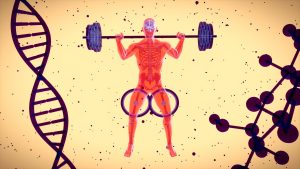
Muscle building is often associated with bodybuilders and athletes, but it’s not just for them. In fact, building muscle can be beneficial for people of all ages and genders. Not only can it help you look better, but it can also improve your overall health.
Key Health Benefits of Muscle Building
1. Improved Bone Health: Building muscle can help prevent bone loss and decrease the risk of fractures. Studies have shown that muscle building can increase bone density and improve overall bone health.
2. Lower Blood Pressure: Muscle building can help reduce blood pressure and reduce your risk of developing heart disease. This is because muscle building can improve blood vessel function and improve overall blood circulation.
3. Improved Joint Health: Building muscle can help reduce joint pain and joint inflammation. This is because strong muscles help support the joints and prevent them from becoming overworked.
4. Reduced Risk of Diabetes: Building muscle can help reduce your risk of developing type 2 diabetes. This is because muscle helps your body process glucose more efficiently, which can reduce your risk of developing diabetes.
5. Improved Mood and Mental Health: Building muscle can help improve your mood and reduce feelings of stress and anxiety. This is because building muscle helps the body release endorphins, which can help improve mental health.
Overall, muscle building can be beneficial for anyone looking to improve their overall health. From improved bone health to improved mood and mental health, there are many benefits to building muscle. So if you’re looking to improve your overall health, give muscle building a try!
If you’re looking to build muscle and get in shape, it’s important to focus on the right things. Muscle building requires dedication and commitment, but if you’re willing to put in the work, you can see impressive results.
Tips to Help You Get Started on your Muscle Building Journey
1. Start with a Plan: The best way to ensure that you’re making progress is to have a plan. This should include both a workout routine and a diet plan. Make sure to focus on compound exercises, like squats and deadlifts, and to include plenty of protein in your diet.
2. Lift Heavy Weights: To build muscle, you need to be lifting heavy weights. This means pushing yourself beyond your comfort zone and challenging your muscles to grow. Start with lighter weights and work your way up as you get stronger.
3. Rest and Recovery: One of the most important aspects of muscle building is rest and recovery. Make sure to give your body time to rest and recover between workouts and to get plenty of sleep at night.
4. Stay Consistent: The key to seeing progress is to stay consistent with your workouts and nutrition. If you can consistently show up and put in the work, you’ll see results.
Building muscle is possible with the right plan and dedication. Make sure to focus on the tips above and you’ll be on your way to achieving the body you’ve been dreaming of.

Clinical Study on Muscle Building
A clinical study to determine the efficacy of muscle building programs in increasing muscle mass has been conducted. Seventy-five healthy men between the ages of 18-35 were included in this study. All participants were sedentary and had no prior history of participation in a muscle building program. Participants were randomly assigned to one of three groups: a weight-training program, a resistance-training program, or a control group.
The weight-training group participated in a program that included free weights, machines, and bodyweight exercises three days per week for 12 weeks. The resistance-training group participated in a program that included machines and bodyweight exercises three days per week for 12 weeks. The control group was instructed to maintain their normal activity level for the duration of the study.
At the start of the study, participants were assessed for body composition, muscular strength, and muscular endurance. Body composition was measured using bioelectrical impedance analysis, muscular strength was measured using a 1-RM (one-repetition maximum) test, and muscular endurance was measured using the number of repetitions completed in a single set of a given exercise. At the end of the 12-week period, participants were reassessed for body composition, muscular strength, and muscular endurance.
The results of the study showed that both the weight-training and the resistance-training groups had significantly increased muscle mass compared to the control group. There was no significant difference in muscle mass gains between the two training groups. However, the weight-training group had significantly greater increases in muscular strength and muscular endurance than the resistance-training group.
These results suggest that both weight-training and resistance-training programs can be effective at increasing muscle mass. However, weight-training is more beneficial for increasing muscular strength and muscular endurance than resistance-training.
Here is an interesting video on muscle building which you may want to check out: